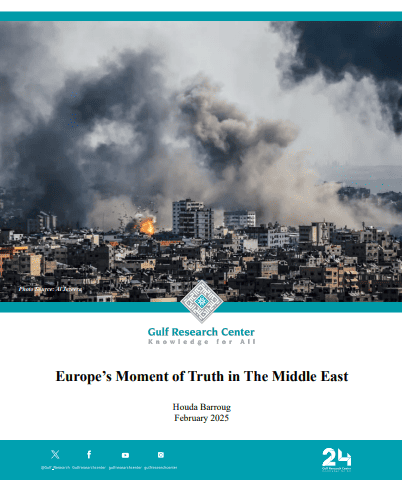
In a scenario when Palestine’s survival is at stake, US President Donald Trump's daring proposal to "take over" Gaza has sent shockwaves through the international community. This unprecedented announcement was made during a joint press conference with Israeli Prime Minister Benjamin Netanyahu, and has thrust the decades-long Israeli-Palestinian conflict into unknown territory, undermining years of diplomatic effort and established geopolitical norms.
As the world grapples with the possible ramifications of this radical proposition, the European Union's response has yet to be disclosed. The EU’s continued silence raises concerns about its commitment to contributing to the future stability of the Middle East, and more specifically, its hesitation is raising questions about the sincerity of its agenda in the region. However, President Trump's plan and the evolving global governance paradigm provide an opportunity for the EU to reaffirm its historical commitment to global peace and stability while demonstrating much-needed leadership in a region facing unprecedented turmoil. By joining its efforts with the GCC states, for example, the EU can position itself as an relevant player in supporting a more stable and just future for Palestine and the broader Middle East.
President Trump's contentious plan includes a total renovation of Gaza under the US administration, proposing to make it "the Riviera of the Middle East." The concept calls for the permanent displacement of Gaza's Palestinian people to other countries, considerable economic development, and reconstruction operations sponsored by the United States. This unorthodox approach, which appears to have been developed without formal policy considerations, has sparked a firestorm of criticism and worry worldwide. The international community's reaction to Trump's Gaza takeover proposal has been immediate and overwhelmingly negative but also divergent.
As fears of Trump's proposal materializing increase, EU leaders are at a crossroads. Initial reactions from EU member states have ranged from cautious diplomatic statements to open rejection of the proposal. Some European politicians have reaffirmed their support for Palestinian self-determination and the two-state solution, while others have called for emergency talks to develop a coordinated EU response. The range of opinions highlights the difficulties confronting the EU in terms of presenting a united front on such a divisive issue. This fragmented approach emphasizes the bloc's internal divides and the challenges involved in developing a single foreign policy on complicated international issues.
Diplomats, human rights organizations, and regional actors are concerned that the plan disregards Palestinian sovereignty. Alongside the Palestinians themselves, Saudi Arabia, Egypt, Turkey, and China, among others have all strongly opposed the concept. Such forced displacement is a violation of international law and will further destabilize the region as a whole. The timing of this declaration, which coincided with the relative development of a ceasefire agreement between Israel and Hamas, has added a further degree of complexity to an already combustible scenario.
Against the backdrop of international outrage, the European Union's historical attitude on the Israeli-Palestinian conflict has to be brought into sharp view. The EU has always campaigned for a two-state solution, which includes Palestinian statehood while keeping close ties with Israel.
Over the years, the bloc has supplied substantial humanitarian aid to Gaza and the West Bank while condemning Israeli occupation and human rights violations. However, this also came in parallel to closer relationships with Israel without necessarily implementing policies that reflect their, although superficial, criticism of the country. This is both on a state-to-state and EU-to-Israel level.
President Trump's suggestion and the subsequent global reaction have now cast a dark shadow on the possibilities for a two-state solution. One can stipulate that the EU’s silence is a strategy for the bloc to amend aspects of its relationship with the US amidst the ongoing US-EU trade war. The EU, a longtime supporter of the two-state path, now struggles with reaffirming its vision for peace in the face of a drastically different proposal. The bloc's response, or lack thereof, will thus have far-reaching consequences for its credibility as a mediator and capacity to engage in and with the region.
In light of the changing US foreign policy approach, the EU is however also provided with a clear opportunity to present itself as a driving catalyst for global security, peace, and transnational relationships capable of clear alternative visions for regional stability and human rights. As an initial step, this would require the EU to engage actively and assertively on the ground, as well as leveraging its humanitarian and diplomatic competencies to meaningfully contribute to both Gaza and the broader regional security and peace processes.
For the EU and GCC, the US drastic shift in direction provides more opportunities for potential initiatives to work closer together on regional matters of mutual concern, especially those highlighted in its Joint Communication on a Strategic Partnership with the Gulf. Wat is undrlined here is the potential of both blocs to serve as significant mediators and partners in the Middle East peace process by reaffirming their commitment to a two-state solution, actively support efforts such as the Global Alliance for the Implementation of the Two-State Solution, and strengthen communication and collaboration with other key regional parties to better work toward a fair and complete resolution to the Israeli-Palestinian conflict.
Building on the blocs’ agreement on humanitarianism and joint development partnerships and the recent dismantling of the United States Agency for International Development (USAID), the EU and GCC can build on and towards various aspects of the EU-GCC Strategic Partnership, particularly the global humanitarian and development partnership. This collaboration would be a unique chance to fill the gaps created by USAID's dismantling by coordinating efforts to provide humanitarian aid and development support in Gaza and elsewhere. The EU, with its expertise in multilateralism, and the GCC, as one of the world's most dependable donors, may collaborate to support UN-led projects, improve humanitarian logistics, and ensure help reaches those in need efficiently. Furthermore, this engagement could help to promote regional stability by supporting programs like the Regional Security Dialogue and addressing common priorities, including conflict resolution, mediation, and confidence-building measures. Taken as a whole, the EU and GCC, with their combined diplomatic expertise and regional perspectives, are well-positioned to facilitate change and perhaps break the long-standing impasse in the peace process.
The negative impact of the Trump administration’s proposal on Middle Eastern regional stability cannot be over-emphasized. If the United States were to take over control of Gaza, it would radically alter the Middle East's geopolitical environment. In such a scenario, the EU's role in preventing possible crises, addressing humanitarian issues, and encouraging communication among all parties involved would become more important than ever. At the same time, the EU's power to influence events on the ground will certainly be further restricted if it fails to respond to the crisis in an immediate, strategic, and cohesive manner.
The coming days and weeks will determine if the EU can rise to the challenge by presenting a clear alternative vision and demonstrating its commitment to regional peace, stability, and human rights. It has to work towards positioning itself as a vital actor in settling the Israeli-Palestinian problem or risk being ignored in one of the most momentous geopolitical developments in recent years. By expanding its partnerships with major regional stakeholders, particularly the GCC, the EU can improve its strategic position and contribute significantly to peace initiatives. The EU's comprehensive Middle East policy provides a timely opportunity to reaffirm the bloc's resolve to promote regional peace and stability as well as strengthen partnerships with key regional stakeholders. This approach is consistent with the EU's long-standing belief that a negotiated political agreement is the only realistic way to achieve security and peace for all parties involved.
* Houda Barroug is a Researcher at the Gulf Research Center (GRC)

